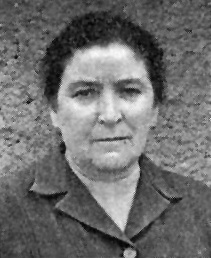Bracha Peli: Difference between revisions
No edit summary |
Specified categories |
||
| Line 75: | Line 75: | ||
[[Category:Ukrainian emigrants to Mandatory Palestine]] |
[[Category:Ukrainian emigrants to Mandatory Palestine]] |
||
[[Category:Ukrainian Ashkenazi Jews]] |
[[Category:Ukrainian Ashkenazi Jews]] |
||
| ⚫ | |||
[[Category:Ukrainian schoolteachers]] |
[[Category:Ukrainian schoolteachers]] |
||
| ⚫ | |||
[[Category:Jewish encyclopedists]] |
[[Category:Jewish encyclopedists]] |
||
Revision as of 23:44, 5 May 2024
Bracha Peli | |
|---|---|
 Peli, 1940s | |
| Born | Bronya Kutzenok 1892 |
| Died | 1986 Israel |
| Occupation | Publisher |
| Known for | Hebrew Book Week |
| Spouse | Meir Pilipovetsky (Peli) |
| Children | Alexander Peli and daughter |
Bracha Peli (Template:Lang-he) (1892–1986) was the founder and owner of the Israeli publishing house, Massada. She was the driving force behind the publication of Encyclopaedia Hebraica,[1] and is credited with starting Israel's annual Hebrew Book Week.[2]
Biography
Bronya Kutzenok (later Bracha Peli) was born in Starovitzky, a small village in Russia, now Ukraine[3] to a family of Hasidic Jews. She was the eldest of seven children. Her father, Shmuel Kutzenok, was a wealthy lumber merchant who supplied timber for artillery wagons to the Russian army. Her mother, Sarah, ran the village general store. She acquired an education by overhearing her brothers' lessons.[3] Early on, she became proficient in Yiddish, Russian and Hebrew. In 1905, when she was about to study at a Gymnasium in Kiev, pogroms against the Jews erupted, disrupting her plans. She waited two years to complete her secondary education and study economics.[3]
In 1914, after her mother died of tuberculosis, Peli met a young Zionist teacher, Meir Pilipovetsky, whom she married against her family's wishes. After her son, Alexander, was born she opened a Jewish secondary school that attracted 400 students in its first year.[3]

In July 1921, Peli and her husband left Russia for Palestine, settling in Tel Aviv.[3] In 1926, Peli opened a stall in Tel Aviv to sell books cheaply, which led to the inauguration of an annual event.[2]
In 1930, she started publishing the books "Masada" in her home. In 1932, she officially founded the publishing house on Herzl Street in Tel Aviv and founded the Palai Press, where the publishing house's books were printed. The first project produced by the publishing house was "The General Encyclopedia" edited by Prof. Yosef Klausner. Other multi-volume projects were the Bible with S.L. Gordon's commentary, a history of music in Europe, the encyclopedia of psychology, "Encyclopedia Mesada" in five volumes, an encyclopedia of culture, an encyclopedia of culture and the world of culture originally translated from Italian (Fabri Publishing) and an encyclopedia for youth "Aviv".
Today Hebrew Book Week is a national 10-day event.[4] The Encyclopaedia Hebraica project began using Bracha Peli's publishing house in 1946 with her son, Alexander, supervising. The last volume was published in 1996.[3]
Bracha Peli died in 1986.[citation needed]
See also
References
- ^ Founder of the Hebrew Enterprise, Uri Dromi, accessed October 2009
- ^ a b Hebrew Book Week :from an open, urban fair into an entertainment festival Archived October 31, 2007, at the Wayback Machine, Shiri Lev-Ari, Jewish Theatre, accessed October 2009
- ^ a b c d e f Bracha Peli, Asher Weill, Jewish Women's Archive. accessed October 2009
- ^ Israel - Book Production Data Economic situation Archived 2009-10-10 at the Wayback Machine, Frankfurt Book Fair, accessed October 2009
- 1892 births
- 1986 deaths
- Encyclopedists
- Israeli women chief executive officers
- Israeli Ashkenazi Jews
- Israeli publishers (people)
- 20th-century Israeli businesswomen
- 20th-century Israeli businesspeople
- Naturalized citizens of Israel
- Businesspeople from Kyiv
- Businesspeople from Tel Aviv
- Ukrainian emigrants to Mandatory Palestine
- Ukrainian Ashkenazi Jews
- Ukrainian schoolteachers
- Ukrainian Zionists
- Jewish encyclopedists
